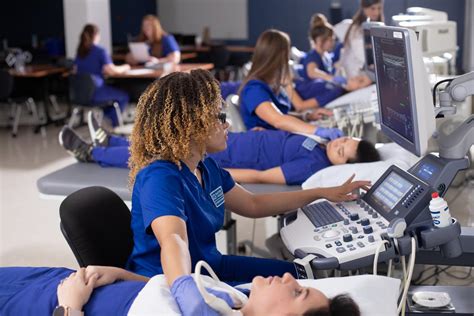Ultrasound technology has become a crucial diagnostic tool in the medical field, allowing healthcare professionals to visualize internal organs and structures without the need for surgery. As a result, the demand for skilled ultrasound technicians, also known as diagnostic medical sonographers, has increased significantly. To meet this demand, many educational institutions offer ultrasound tech programs that provide students with the necessary coursework and skills to succeed in this field.
The Importance of Ultrasound Technology in Healthcare
Ultrasound technology plays a vital role in modern healthcare, enabling doctors to diagnose and treat a wide range of medical conditions. From monitoring fetal development during pregnancy to guiding minimally invasive procedures, ultrasound technology has numerous applications in various medical specialties. The increasing demand for ultrasound services has created a need for highly skilled and knowledgeable ultrasound technicians.
Ultrasound Tech Curriculum: Coursework and Skills
A typical ultrasound tech program includes a combination of classroom instruction and clinical training. The curriculum is designed to provide students with a comprehensive understanding of ultrasound technology, as well as the skills and knowledge necessary to succeed in this field.
Foundational Courses
The foundational courses in an ultrasound tech program cover the basics of ultrasound technology, including:
- Introduction to Ultrasound: This course provides an overview of ultrasound technology, including its history, principles, and applications.
- Anatomy and Physiology: Students learn about the human body's systems and structures, which is essential for understanding ultrasound images.
- Physics of Ultrasound: This course covers the physical principles of ultrasound technology, including frequency, amplitude, and velocity.
Clinical Courses
The clinical courses in an ultrasound tech program focus on the practical application of ultrasound technology in various medical specialties. Some examples of clinical courses include:
- Obstetric and Gynecologic Ultrasound: Students learn how to perform ultrasound examinations on pregnant women and women with gynecologic conditions.
- Abdominal Ultrasound: This course covers the use of ultrasound technology to examine the abdominal organs, including the liver, gallbladder, and kidneys.
- Cardiovascular Ultrasound: Students learn how to use ultrasound technology to evaluate the heart and blood vessels.
Clinical Training
Clinical training is a critical component of an ultrasound tech program. Students gain hands-on experience performing ultrasound examinations on patients under the supervision of experienced instructors.
Skills and Knowledge
To succeed as an ultrasound technician, students need to develop a range of skills and knowledge, including:
- Technical Skills: Students learn how to operate ultrasound equipment, adjust settings, and optimize image quality.
- Patient Communication: Ultrasound technicians need to be able to communicate effectively with patients, explaining the procedure and providing instructions.
- Critical Thinking: Students learn how to analyze ultrasound images, identify abnormalities, and make decisions about further testing or treatment.
- Professionalism: Ultrasound technicians need to maintain a professional demeanor, adhering to patient confidentiality and safety protocols.

Specializations
Some ultrasound tech programs offer specializations in specific areas, such as:
- Pediatric Ultrasound: Students learn how to perform ultrasound examinations on infants and children.
- Neurosonography: This specialization focuses on the use of ultrasound technology to evaluate the brain and nervous system.
- Musculoskeletal Ultrasound: Students learn how to use ultrasound technology to examine muscles, tendons, and ligaments.
Certification and Licensure
After completing an ultrasound tech program, graduates are eligible to take the certification exam offered by the American Registry for Diagnostic Medical Sonography (ARDMS). Certification demonstrates a level of competence and knowledge in the field of ultrasound technology.
Ultrasound Tech Salary and Job Outlook
The salary and job outlook for ultrasound technicians are highly favorable. According to the Bureau of Labor Statistics, the median annual salary for diagnostic medical sonographers was $62,610 in May 2020. The job outlook is also positive, with employment opportunities projected to grow 17% from 2020 to 2030.
Conclusion
Ultrasound technology plays a vital role in modern healthcare, and the demand for skilled ultrasound technicians continues to grow. An ultrasound tech program provides students with the necessary coursework and skills to succeed in this field. By completing a program and obtaining certification, graduates can embark on a rewarding and challenging career in ultrasound technology.






What is the typical salary range for ultrasound technicians?
+The median annual salary for diagnostic medical sonographers was $62,610 in May 2020, according to the Bureau of Labor Statistics.
What is the job outlook for ultrasound technicians?
+Employment opportunities for diagnostic medical sonographers are projected to grow 17% from 2020 to 2030, according to the Bureau of Labor Statistics.
What type of education do I need to become an ultrasound technician?
+Most ultrasound technicians complete a postsecondary certificate or associate's degree program in diagnostic medical sonography.
We hope this article has provided you with valuable information about the ultrasound tech curriculum and the skills and knowledge required to succeed in this field. If you have any further questions or would like to share your experiences, please feel free to comment below.
